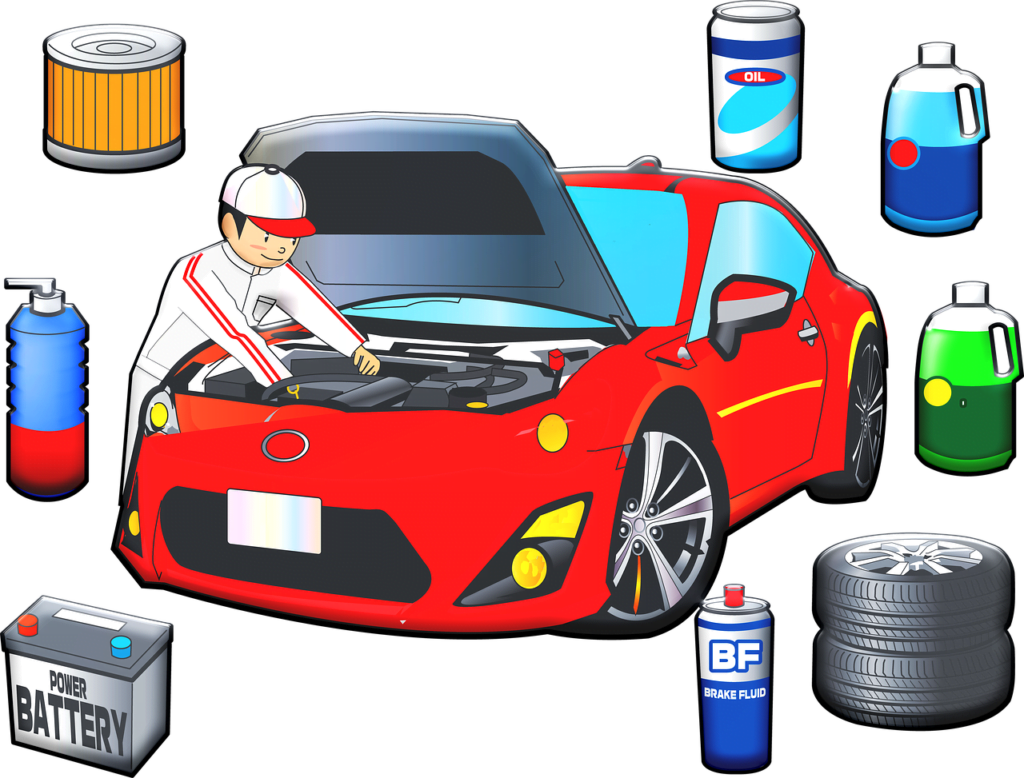
In today’s world, where cars are a significant investment, extending their longevity and ensuring optimal performance is paramount. By adopting proactive maintenance practices, you can safeguard your vehicle from premature wear and tear, enhance fuel efficiency, and foster a smoother, safer driving experience. This comprehensive guide delves into the top 10 car maintenance tips that every conscientious owner should embrace.
Adhering to the Manufacturer’s Recommended Service Schedule
The foundation of effective car maintenance lies in following the manufacturer’s recommended service schedule meticulously. This schedule, outlined in your vehicle’s owner’s manual, serves as a roadmap for routine maintenance tasks, including oil changes, filter replacements, and comprehensive inspections. Adhering to these guidelines ensures that critical components are regularly checked and serviced, preventing premature wear and potential breakdowns. Compliance with the service schedule not only preserves your car’s warranty but also keeps it operating at its optimal level, maximizing its lifespan and performance.
Understanding the Importance of Timely Oil Changes
Among the maintenance tasks outlined in your service schedule, regular oil changes are paramount. Engine oil acts as the lifeblood of your vehicle, lubricating the intricate moving parts and preventing excessive heat buildup. Over time, however, oil breaks down and becomes less effective, potentially leading to engine damage if left unaddressed.
When selecting the appropriate oil for your vehicle, consider using high-quality synthetic oils, which offer enhanced performance and longevity compared to conventional options. Timely oil changes promote smoother engine operation, improved fuel efficiency, and ultimately prolong the life of your engine, making this maintenance task an indispensable part of your car care routine.
Ensuring Air and Fuel Filter Maintenance
Air and fuel filters play a crucial role in maintaining your car’s performance and fuel efficiency. The air filter prevents dust, debris, and contaminants from entering the engine, while the fuel filter ensures a clean and uninterrupted fuel supply. Over time, these filters can become clogged, affecting engine performance, fuel economy, and potentially leading to costly repairs.
During regular car maintenance, ensure that all filters are inspected and replaced as recommended by your vehicle’s manufacturer. While fuel filters typically have a longer lifespan, they should still be replaced at regular intervals to maintain optimal engine performance and efficiency. Clean filters promote proper air-to-fuel ratios, efficient combustion, and improved overall engine health.
Prioritizing Tire Care for Safety and Efficiency
Proper tire maintenance is essential for ensuring both safety and fuel efficiency. Neglecting this aspect of car care can lead to compromised handling, increased fuel consumption, and even dangerous situations on the road.
Maintaining Optimal Tire Pressure
Tire pressure plays a critical role in your vehicle’s performance and safety. Check your tire pressure regularly, ideally at least once a month, using a reliable pressure gauge. Refer to the recommended tire pressure specified in your vehicle’s owner’s manual or the label inside the driver’s side door jamb.
Underinflated tires increase rolling resistance, resulting in decreased fuel efficiency, while overinflated tires can lead to reduced traction and uneven wear. By maintaining optimal tire pressure, you not only enhance your vehicle’s fuel economy but also ensure a smoother, safer ride.
Monitoring Tread Depth and Tire Condition
In addition to tire pressure, regularly inspect your tires for signs of damage or excessive wear. The penny test is a simple yet effective way to assess tread depth – if you can see the top of Lincoln’s head when inserting a penny into the tread groove, it’s time to consider replacing your tires.
Rotating your tires during regular car maintenance or as recommended by the manufacturer helps ensure even tread wear and extends their lifespan. Well-maintained tires with adequate tread depth contribute to better traction, improved handling, and a smoother ride, ultimately enhancing your overall driving experience.
Fluid Level Maintenance: A Vital Aspect of Car Care
Monitoring and maintaining the levels of essential fluids in your vehicle is crucial for optimal performance and longevity. These fluids play pivotal roles in various systems, and neglecting their levels can lead to overheating, poor braking, transmission problems, and steering issues, among other complications.
Regularly Checking and Topping Up Fluids
Make it a habit to regularly check the levels of engine oil, coolant, brake fluid, transmission fluid, and power steering fluid. Consult your vehicle’s owner’s manual for guidance on the recommended intervals and procedures for checking and topping up these fluids.
If you notice any significant fluid loss or leakage, it’s essential to have your vehicle inspected by a professional mechanic to identify and address the underlying issue promptly. Proper fluid levels contribute to the smooth operation of various systems in your car, ensuring optimal performance, reliability, and longevity.
Coolant System Maintenance
The coolant system plays a critical role in maintaining your engine’s temperature within the optimal range. Regular flushing of the coolant system is necessary to eliminate contaminants and maintain its efficiency. Follow your manufacturer’s recommendations regarding coolant system maintenance, as neglecting this aspect can lead to overheating and potentially catastrophic engine damage.
Battery Care: Ensuring Reliable Starting Power
A well-functioning battery is essential for starting your vehicle and powering various electrical components. Regular battery maintenance can prevent frustrating situations, such as being stranded due to a dead battery, and extend the lifespan of this crucial component.
Inspecting and Cleaning the Battery
Regularly inspect your battery for signs of corrosion, such as white or greenish deposits, and clean it if necessary. Corrosion can impede the battery’s performance and lead to premature failure. Additionally, check the battery connections to ensure they are secure and tight, as loose connections can cause electrical issues.
Battery Testing and Replacement
If your battery is older or shows signs of weakness, consider having it tested or replaced during regular car maintenance. Extreme temperatures can also affect battery performance, so take precautions during hot or cold weather by ensuring proper insulation and ventilation.
Regular battery maintenance ensures reliable starting power and prevents the inconvenience and potential safety hazards associated with a dead battery, making it a crucial aspect of your car care routine.
Addressing Warning Lights and Unusual Noises
Pay close attention to warning lights on your dashboard and any unusual noises coming from your vehicle. These indicators can provide valuable insights into potential issues that require immediate attention.
Decoding Warning Lights
Warning lights on your dashboard are designed to alert you to potential problems within various systems of your vehicle. From the check engine light to indicators for brakes, tire pressure, and more, these lights should never be ignored. If a warning light illuminates, consult your owner’s manual or seek professional assistance to diagnose and resolve the underlying issue promptly.
Investigating Unusual Noises
Unusual noises, such as squealing brakes, grinding sounds, or rattling under the hood, may be signs of worn-out components or mechanical issues. Promptly addressing these noises can prevent further damage and costly repairs down the line. If you notice any concerning sounds, have your vehicle inspected by a qualified mechanic to identify and rectify the problem before it escalates.
Brake System Maintenance: Ensuring Safety on the Road
The brake system is one of the most critical components of your vehicle, as it directly impacts your safety on the road. Regular inspection and maintenance of the brake system are essential to ensure optimal performance and prevent potential hazards.
Inspecting Brake Pads, Rotors, and Fluid
Regular inspection of brake pads, rotors, and fluid levels is crucial for safe driving. Worn brake pads can compromise your vehicle’s stopping power, while damaged rotors can lead to vibrations and decreased braking efficiency. Additionally, monitoring the brake fluid level and condition can help prevent brake system failures.
During regular car maintenance, have a professional mechanic inspect your brake system and replace any worn or damaged components as necessary. Neglecting brake system maintenance can have severe consequences, putting you and other road users at risk.
Transmission Maintenance: Ensuring Smooth Gear Shifts
The transmission system plays a vital role in transferring power from the engine to the wheels, enabling smooth gear shifts and efficient power delivery. Neglecting transmission maintenance can lead to costly repairs and potentially shorten the lifespan of your vehicle.
Transmission Fluid Checks and Changes
Transmission fluid lubricates and cools the transmission components, ensuring smooth operation. Over time, this fluid can break down and become less effective, leading to transmission issues. Follow your manufacturer’s recommendations for checking and changing the transmission fluid, as neglecting this task can result in premature transmission failure.
During regular car maintenance, have a qualified mechanic inspect the transmission fluid level and condition. If the fluid appears discolored or contaminated, it may be time for a transmission fluid change to ensure optimal performance and longevity of your transmission system.
Suspension and Alignment: Enhancing Ride Quality and Handling
The suspension system and wheel alignment play crucial roles in your vehicle’s ride quality, handling, and tire wear. Regular maintenance in these areas can prevent premature tire replacement and ensure a comfortable, controlled driving experience.
Inspecting Shocks, Struts, and Suspension Components
Shocks and struts are responsible for absorbing the impact of road irregularities, providing a smooth and comfortable ride. Over time, these components can wear out, leading to a rough and bouncy ride, as well as decreased handling and control.
During regular car maintenance, have a professional mechanic inspect the shocks, struts, and other suspension components for signs of wear or damage. Replacing worn components can significantly improve your vehicle’s ride quality and handling characteristics.
Maintaining Proper Wheel Alignment
Proper wheel alignment ensures that your tires are positioned correctly, promoting even tread wear and optimal handling. Misaligned wheels can cause premature tire wear, decreased fuel efficiency, and a potential loss of control while driving.
It’s recommended to have your vehicle’s wheel alignment checked annually or after any significant impact, such as hitting a curb or pothole. Addressing alignment issues promptly can extend the life of your tires and improve your overall driving experience.
Seasonal Maintenance: Adapting to Changing Conditions
Seasonal changes can have a significant impact on your vehicle’s performance and maintenance needs. By adapting your car care routine to the changing weather conditions, you can ensure optimal performance and safety throughout the year.
Winter Preparation
As winter approaches, it’s crucial to prepare your vehicle for the colder temperatures and potential hazards of snow and ice. Replace your windshield wipers with winter-specific blades, check the condition of your battery, and consider using winter tires in areas with harsh winter conditions. Additionally, ensure that your coolant mixture is suitable for freezing temperatures to prevent engine damage.
Summer Maintenance
During the summer months, monitor your tire pressures closely, as heat can affect the air pressure within your tires. Additionally, ensure that your air conditioning system is functioning properly to maintain a comfortable cabin temperature and prevent excessive strain on your vehicle’s components.
Advanced Maintenance Considerations
While the tips outlined above cover the essential aspects of car maintenance, there are additional considerations for those seeking a more comprehensive approach to extending their vehicle’s lifespan and optimizing its performance.
Spark Plug Maintenance
The condition of your spark plugs directly impacts engine performance. Regular inspections and timely replacements can prevent power loss, misfiring, and other issues that can negatively affect your engine’s health. Follow your manufacturer’s recommendations for spark plug replacement intervals to ensure optimal engine performance and efficiency.
Serpentine Belt Inspection and Replacement
The serpentine belt is responsible for driving multiple peripheral devices in your vehicle, such as the alternator, power steering pump, and air conditioning compressor. Inspect this belt regularly for signs of wear, cracks, or fraying, and replace it according to your manufacturer’s recommendations. A failed serpentine belt can lead to the failure of multiple systems, potentially leaving you stranded.
Comprehensive Fluid Checks
In addition to the essential fluids mentioned earlier, it’s crucial to inspect and maintain the levels of other vital fluids in your vehicle, such as brake fluid, power steering fluid, and any other fluids specific to your make and model. Regular fluid checks and replacements can prevent leaks, contamination, and potential system failures, ultimately extending the lifespan of your vehicle’s components.
Keeping Maintenance Records: Documenting Your Car’s History
Documenting all maintenance activities provides a valuable history for your vehicle, aiding in troubleshooting and potentially increasing its resale value. Maintain a log or folder with receipts, invoices, and detailed notes on the services performed, including the dates, mileage, and any specific issues addressed.
This maintenance record can serve as a comprehensive reference for future repairs or maintenance needs, ensuring that no critical task is overlooked. Additionally, a well-documented maintenance history can be a selling point when it comes time to trade in or sell your vehicle, as it demonstrates responsible ownership and care.
Embracing Proactive Car Maintenance for Long-Term Benefits
Implementing a proactive and comprehensive car maintenance routine is the key to maximizing your vehicle’s lifespan, ensuring optimal performance, and fostering a safer, more enjoyable driving experience. By adhering to the top 10 car maintenance tips outlined in this guide, you can prevent costly repairs, enhance fuel efficiency, and ultimately protect your investment in your beloved automobile.
Remember, regular maintenance is not just a recommendation – it’s an essential aspect of responsible car ownership. By prioritizing the care and upkeep of your vehicle, you can enjoy the peace of mind that comes with a reliable, well-maintained mode of transportation for years to come.
Embrace the proactive mindset of car maintenance, and embark on a journey of longevity, efficiency, and driving pleasure with your trusty four-wheeled companion.







